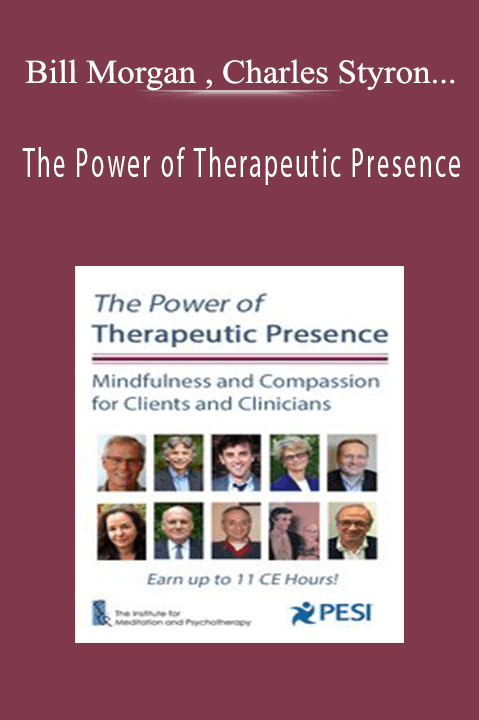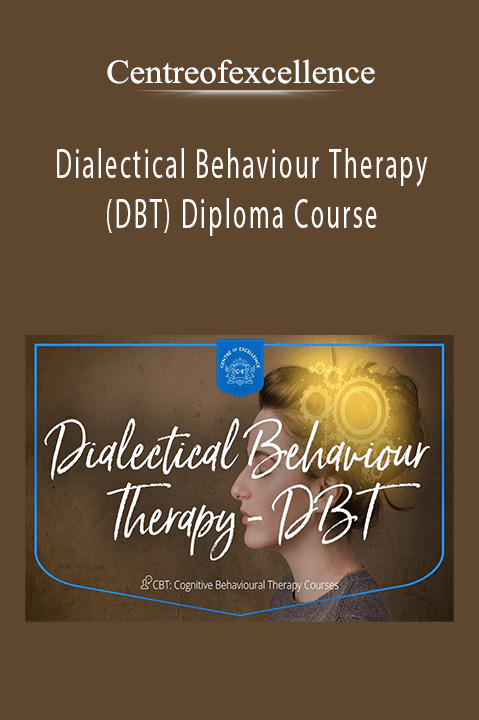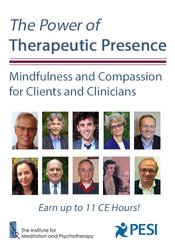The Power of Therapeutic Presence: Mindfulness and Compassion for Clients and Clinicians – Bill Morgan , Charles Styron, Christopher Willard , Christopher Germer , Janet Surrey , Mitch Abblett , Peter Fulton , Ronald D. Siegel & …
Presence is a gift, to both our clients and ourselves.
Yet many clinicians like you are unsure about how to enhance therapeutic presence to deepen client connection, strengthen therapeutic relationships and improve outcomes.
We’ve brought together leading clinicians from The Institute for Meditation and Psychotherapyand faculty from Harvard Medical School including Drs. Christopher Germer, Ron Siegel, Christopher Willard, and Susan Pollak to share with us ten enlightening and engaging sessions on deepening Presence, to enhance both your professional practice and personal wellbeing.
The Power of Therapeutic Presence is a unique online course filled with practical meditative and mindfulness exercises and tools that will cultivate presence deeply into your clinical work and life.
Session 1
The Science of Mindfulness and Compassionate Presence
Featuring Christopher Willard, PsyD
Mindful and compassionate presence are not just trendy ideas, but have a deep history, as well as a powerful underlying physiology and neuroscience to explain them. In this session, you’ll discover the fascinating neuroscience behind contemplative practice, as well as simple ways to share the science with your clients. We’ll explore and practice multiple techniques that you can use yourself or with clients in and out of the therapy hour.
Session 2:
Cultivating Presence through Mindfulness and Compassion
Featuring Christopher Germer, PhD
Self-compassion is a state of warm, connected presence during difficult moments in our lives. It is an inner strength that can be cultivated inside or outside the consultation office. During therapy, self-compassion can help a therapist to recognize and “be with” difficult emotions within themselves and thereby stay in connection with their clients—a key component of therapeutic presence, and a core ingredient of skillful management of the therapeutic encounter. In this session, a simple self-compassion practice will be taught to help therapists maintain compassionate presence in therapy.
Session 3
Being Present with Pain
Featuring Ronald Siegel, PsyD
As long as we’re alive, we experience pain. Unfortunately, many of our hard-wired responses to both physical and emotional pain multiply our miseries, trapping us in viscous cycles of suffering. This session focuses on ways to be present with pain that interrupt these cycles, freeing us from unnecessary suffering. Therapeutic presence arises from a clinician and clients’ increased willingness to relate to pain with flexibility versus control and avoidance.
Session 4
Therapeutic Presence via the Mindful Communication Sequence (MCS):
A Mindfulness-Based Communication Method for Clinicians
Featuring Mitch Abblett, PhD
The best therapy outcomes come for clinicians who cultivate and maintain high quality therapeutic alliances with their clients. In this session, you’ll learn a simple, comprehensive method (MCS) for understanding, managing and enhancing the authenticity of therapeutic communication. The evidence-based mindfulness and here-and-now relationship management skills covered in the method will improve your therapeutic alliances with clients, build your “presence” and maximize effective intervention timing to improve therapeutic outcomes.
Session 5
The Art of Equanimity
Featuring Susan Pollak, MTS, EdD
To learn the skill of equanimity is to learn how to find balance in our lives. It is the development of a steadiness of mind and a calm understanding that allows us to be with our constantly changing world. This is especially useful for clinicians as it allows us to sit with whatever arises in our consulting rooms! In this session, we’ll begin cultivating equanimity both cognitively and experientially—through key equanimity meditations—that will enable us to connect more deeply without being overwhelmed by the pain we see, hear, and feel in our practice.
Session 6
The Boundless Universe of Presence
Featuring Charles Styron, PsyD
From the point of view of Tibetan Buddhist psychology, presence can be seen as a gateway into the virtual entirety of the Dharma teachings. Understanding and cultivating mindfulness practice within this understanding is a pathway to deepened therapeutic presence and clinical impact with clients. In this session, we will explore presence in stages: a beginning, a middle, and an end—a ground, a path, and a fruition.
Session 7
Cultivating Presence through Mindful Self-Care
Featuring Tom Pedulla, LICSW
Discover how self-care can increase your capacity to be more fully present—with yourself, your patients, and with others in your life. Through a combination of didactic material, discussion, and simple mindfulness exercises, this session will give you practical tools and skills you can start using right away to practice better self-care, both inside and outside of the clinical hour.
Session 8
Presence in the Face of Unwelcome Uncertainty and Insecurity
Featuring Paul Fulton, EdD
Personal insecurity is a common presenting clinical issue in psychotherapy clients. A Buddhist perspective, with the recognition of the universality of suffering, offers alternative pathways to meet and overcome this source of distress in both our clients and ourselves. In this session, you’ll learn how this perspective helps clinicians in engaging their own painful experience during psychotherapy, to increase their capacity for engaging with and alleviating the suffering of clients.
Session 9
Creating the Inner Holding Environment in Meditation
Featuring Bill Morgan, PsyD & Susan Morgan, MSN, RN, CS
Why do westerners struggle to establish a regular meditation practice? Could it be that traditional instructions are not engaging enough for our high stimulus cultural milieu? Creating a sound, consistent formal meditation practice translates into deeper therapeutic presence—the capacity and skill set of the clinician to create a sound, healing holding environment for their clients. This session focuses on identifying and engaging core elements of an internal holding environment, with ideas about how to cultivate them.
Session 10
The Buddha’s Wife: The Power of Relational Mindfulness in Clinical Practice
Featuring Janet Surrey, PhD
Using the methods of Insight Dialogue, a co-meditative mindfulness practice, clinicians develop increased awareness of their co-created interpersonal patterns, and thereby deepen their personal and professional presence. Using the story of the historical Buddha’s wife as an anchoring example, this session explores the foundations and significant implications of interpersonal resonance for healing and how clinicians’ harnessing presence can be used as a relational unity. Through demonstration and discussion, you’ll learn clinical applications for the therapy relationship.
Get Download The Power of Therapeutic Presence: Mindfulness and Compassion for Clients and Clinicians – Bill Morgan , Charles Styron, Christopher Willard , Christopher Germer , Janet Surrey , Mitch Abblett , Peter Fulton , Ronald D. Siegel & … at Offimc.click Now!
Delivery Information
- Upon ordering the product, a delivery email with download instructions will be sent immediately to you so that you may download your files. If you log in (or create an account) prior to purchase you will also be able to access your downloads from your account dashboard.
- It is a digital download, so please download the order items and save them to your hard drive. In case the link is broken for any reason, please contact us and we will resend the new download link to you.
- If you don't receive the download link, please don’t worry about that. We will update and notify you as soon as possible from 8:00 AM – 8:00 PM (UTC+8).
- Please Contact Us if there are any further questions or concerns you may have. We are always happy to assist!








6 reviews for Bill Morgan , Charles Styron, Christopher Willard , Christopher Germer , Janet Surrey , Mitch Abblett , Peter Fulton , Ronald D. Siegel & … – The Power of Therapeutic Presence: Mindfulness and Compassion for Clients and Clinicians
There are no reviews yet.